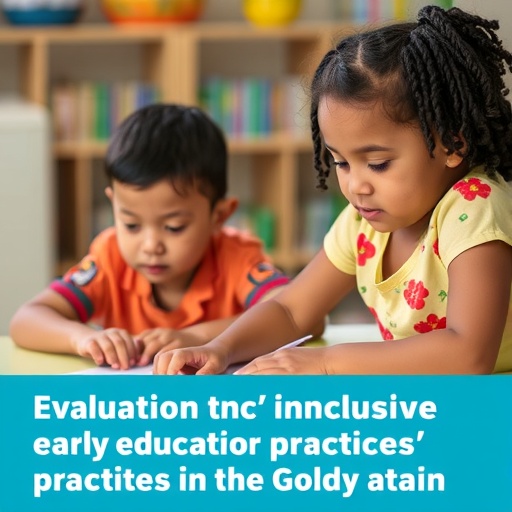In recent years, the conversation surrounding inclusive early education has gained significant momentum, particularly in the Gulf region. As nations strive to meet international education standards and cater to a diverse population, the methods employed by school leaders become increasingly vital. A new study exploring these dynamics has emerged, shedding light on the quality of practices in inclusive early education. This groundbreaking research, conducted by Alnuaimi, Opoku, and Tekin, aims to assess how school leaders in the Gulf context are fostering inclusive educational environments.
The importance of early education cannot be overstated, as it lays the foundation for lifelong learning and development. The researchers emphasize that every child, regardless of their background or abilities, deserves access to quality education. As such, schools play a crucial role in ensuring that inclusive practices are not just theoretical but deeply embedded in their daily operations. The study illustrates that school leaders are positioned at the forefront of this transformation, playing a pivotal role in the implementation of inclusive education policies.
Within the Gulf region, the diversity of student populations presents both opportunities and challenges for educational institutions. Children come from various linguistic, cultural, and socio-economic backgrounds, making effective inclusion increasingly important. The research highlights that school leaders must be equipped with the necessary skills and knowledge to navigate these complexities. This involves fostering an environment that not only welcomes diversity but celebrates it, producing a rich tapestry of learning experiences for all students.
Additionally, the study outlines various practices employed by school leaders to enhance inclusivity. One prominent practice identified was the establishment of professional development programs for teachers — a critical element in preparing educators to work with diverse learning needs. By investing in their staff, school leaders can create a culture of continuous improvement, ensuring that every teacher feels competent and confident in their ability to support all students.
Collaborative relationships between families and schools are also addressed in the research. When families are actively involved in their child’s educational journey, it leads to more successful outcomes. School leaders are encouraged to build strong partnerships with parents, providing them with resources and support to make informed decisions about their child’s education. This collaborative approach not only benefits students but also strengthens the community as a whole.
Moreover, the findings of the study reveal that inclusive education is not a one-size-fits-all solution. The diverse nature of the Gulf region requires tailored approaches that take into consideration the unique needs of individual schools and their communities. Accordingly, the research advocates for school leaders to engage in reflective practices, allowing them to analyze their current methodologies and make data-driven decisions to improve inclusivity in their schools.
In addition, school leaders are urged to cultivate an environment of acceptance and understanding among staff and students. This means creating awareness programs focusing on the value of diversity and fostering a culture that diminishes biases and stereotypes. A significant focus is placed on the emotional well-being of all students, as inclusive practices can significantly enhance their social and emotional development, leading to a more holistic educational experience.
Furthermore, the researchers emphasize the significance of resource allocation in ensuring effective inclusive practices. School leaders are tasked with advocating for adequate funding and resources that provide all students with access to the tools they need for success. This can include assistive technologies, specialized training for staff, and essential materials that enhance inclusive practices across the curriculum.
The study also draws attention to the role of policymakers in supporting inclusive education initiatives. For school leaders to effectively implement inclusive practices, there needs to be a clear framework and support from national education authorities. The researchers call for policies that not only endorse inclusive education but also provide the necessary infrastructure to sustain these efforts. This collaboration between policymakers and educators is crucial in establishing a cohesive educational environment focused on equity and access.
As the study concludes, the implications of these findings extend beyond the realm of education, touching on broader societal issues. Inclusive early education is inherently linked to social justice and equity, making it a matter of critical importance for the Gulf region. When schools are equipped to support all learners, they contribute to the formation of a more tolerant and inclusive society.
The work of Alnuaimi, Opoku, and Tekin marks a significant step toward understanding the role of school leaders in fostering inclusivity in early education context. Their research not only evaluates current practices but also sets the groundwork for future studies to replicate and expand upon in evolving educational landscapes. The insights provided serve as a valuable resource for educators, administrators, and policymakers alike, as they endeavor to create truly inclusive educational environments.
Ultimately, the study aligns with global trends emphasizing the importance of inclusion in education. As the Gulf region continues to develop and refine its educational systems, the insights garnered from this research are poised to inform best practices and drive meaningful change in the years to come. Through concerted efforts from school leaders, educators, families, and policymakers, the aspiration for an inclusive and equitable education system can become a reality, positively impacting countless young learners.
The findings from this assessment call for action and commitment from all stakeholders involved in education — a powerful reminder of the collective responsibility to ensure that every child has the opportunity not just to learn but to thrive.
Subject of Research: Assessment of quality practices in inclusive early education in the Gulf context.
Article Title: Inclusive Early Education in the Gulf context: An Assessment of Quality of Practices by School Leaders.
Article References: Alnuaimi, A., Opoku, M.P., Tekin, A.K. et al. Inclusive Early Education in the Gulf context: An Assessment of Quality of Practices by School Leaders. IJEC 57, 485–504 (2025). https://doi.org/10.1007/s13158-024-00407-z
Image Credits: AI Generated
DOI: 10.1007/s13158-024-00407-z
Keywords: Inclusive education, Gulf region, early childhood education, school leadership, diversity in education, educational policy.




